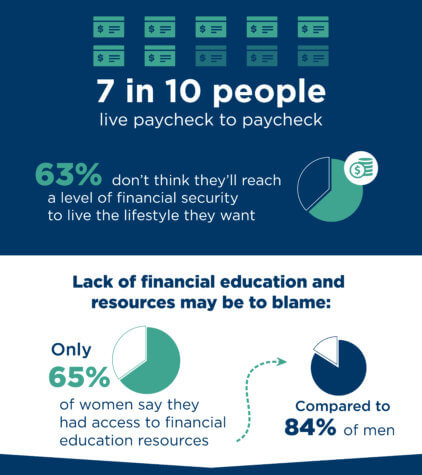NEW YORK (StudyFinds.org) — In these tough financial times, a new study finds it’s getting harder and harder for people to save any of their money. In fact, seven in 10 Americans say they’re living paycheck to paycheck.
A recent survey of 2,007 adults found that 63 percent don’t see themselves reaching a level of financial security that will allow them to live the lifestyle they want.
Lack of financial education and resources may be to blame, particularly for women, who were less likely to say they had access to these tools in comparison to men (65% vs. 84%).
What does financial comfort really look like?
To educate themselves en route to financial comfort, most turn to social media (45%), their family (44%), or online media such as financial news websites (42%).
Conducted on November 22, 2021 by OnePoll on behalf of AmeriLife, the survey also explored the necessities for financial peace of mind among different groups.
While most women noted an absence of credit card debt (59%) as the most important requirement for financial comfort, the majority of men think it’s homeownership (58%).
Saving is key to financial stability
Respondents also differed in what they consider to be essential for financial wellness. Seventy-nine percent of Americans earning over $150,000 found a savings account to be “very” important, compared to just 54 percent of those with an income of $60,000 to $89,999.
On average, respondents feel they’d need $686 of disposable income per month to feel financially comfortable.

When it comes to retirement, the average American plans to start thinking about it at age 40. However, seven in 10 confess their understanding of personal financial comfort kept changing after they reached adulthood.
“Things don’t always go according to plan; no matter your income, having a budget is key,” says Denny Southern, president of annuities and retirement planning for AmeriLife, in a statement. “If possible, a person should have six months of expenses readily available in savings. Once they achieve this, they can then target 30 percent of their income for things they want, and the remaining 20 percent for their savings. The earlier a person can do this, the further it will take them towards a comfortable retirement.”
Overcoming financial hurdles
Seventy-six percent of millennials are likely to say that at some point in their adult life, a personal healthcare-related bill caused them to spend a large chunk of their savings. They also noted that keeping up with healthcare-related bills has derailed them from making other payments (70%), more so than any other age group.
For most of the millennial respondents, that sacrifice came in the form of a down payment or mortgage on a home (57% and 56%).
Regardless of age, the vast majority of Americans (82%) believe that financial comfort is important to their mental and emotional well-being.
“It’s important to know how to offset costs of both planned and unforeseen events,” adds Frank Tebyani, president of career agency distribution for AmeriLife. “It’s not surprising to note, however and unfortunately, that only three in 10 respondents use financial advisors as a resource to educate themselves to attain financial comfort.”
ESSENTIALS FOR FINANCIAL COMFORT:
- No credit card debt (57%)
- Good credit score (54%)
- Homeownership (53%)
- Residual/ancillary income (52%)
- Savings account/rainy day fund (52%)
- Being able to retire (51%)




























